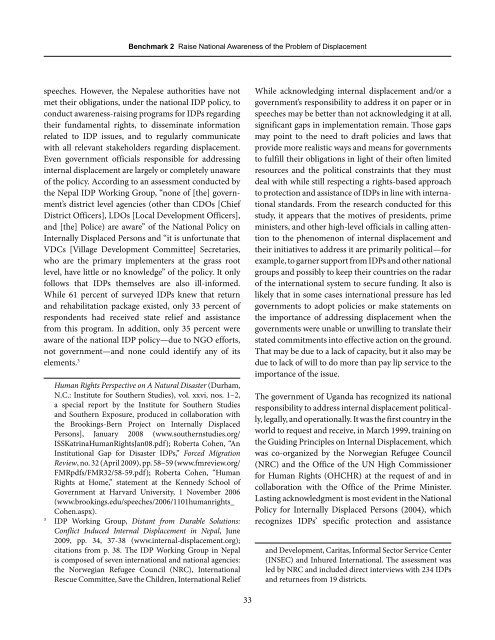From Responsibility to Response: Assessing National - Brookings
From Responsibility to Response: Assessing National - Brookings
From Responsibility to Response: Assessing National - Brookings
You also want an ePaper? Increase the reach of your titles
YUMPU automatically turns print PDFs into web optimized ePapers that Google loves.
Benchmark 2 Raise <strong>National</strong> Awareness of the Problem of Displacement<br />
speeches. However, the Nepalese authorities have not<br />
met their obligations, under the national IDP policy, <strong>to</strong><br />
conduct awareness-raising programs for IDPs regarding<br />
their fundamental rights, <strong>to</strong> disseminate information<br />
related <strong>to</strong> IDP issues, and <strong>to</strong> regularly communicate<br />
with all relevant stakeholders regarding displacement.<br />
Even government officials responsible for addressing<br />
internal displacement are largely or completely unaware<br />
of the policy. According <strong>to</strong> an assessment conducted by<br />
the Nepal IDP Working Group, “none of [the] government’s<br />
district level agencies (other than CDOs [Chief<br />
District Officers], LDOs [Local Development Officers],<br />
and [the] Police) are aware” of the <strong>National</strong> Policy on<br />
Internally Displaced Persons and “it is unfortunate that<br />
VDCs [Village Development Committee] Secretaries,<br />
who are the primary implementers at the grass root<br />
level, have little or no knowledge” of the policy. It only<br />
follows that IDPs themselves are also ill-informed.<br />
While 61 percent of surveyed IDPs knew that return<br />
and rehabilitation package existed, only 33 percent of<br />
respondents had received state relief and assistance<br />
from this program. In addition, only 35 percent were<br />
aware of the national IDP policy—due <strong>to</strong> NGO efforts,<br />
not government—and none could identify any of its<br />
elements. 3<br />
Human Rights Perspective on A Natural Disaster (Durham,<br />
N.C.: Institute for Southern Studies), vol. xxvi, nos. 1–2,<br />
a special report by the Institute for Southern Studies<br />
and Southern Exposure, produced in collaboration with<br />
the <strong>Brookings</strong>-Bern Project on Internally Displaced<br />
Persons], January 2008 (www.southernstudies.org/<br />
ISSKatrinaHumanRightsJan08.pdf); Roberta Cohen, “An<br />
Institutional Gap for Disaster IDPs,” Forced Migration<br />
Review, no. 32 (April 2009), pp. 58–59 (www.fmreview.org/<br />
FMRpdfs/FMR32/58-59.pdf); Roberta Cohen, “Human<br />
Rights at Home,” statement at the Kennedy School of<br />
Government at Harvard University, 1 November 2006<br />
(www.brookings.edu/speeches/2006/1101humanrights_<br />
Cohen.aspx).<br />
3 IDP Working Group, Distant from Durable Solutions:<br />
Conflict Induced Internal Displacement in Nepal, June<br />
2009, pp. 34, 37-38 (www.internal-displacement.org);<br />
citations from p. 38. The IDP Working Group in Nepal<br />
is composed of seven international and national agencies:<br />
the Norwegian Refugee Council (NRC), International<br />
Rescue Committee, Save the Children, International Relief<br />
33<br />
While acknowledging internal displacement and/or a<br />
government’s responsibility <strong>to</strong> address it on paper or in<br />
speeches may be better than not acknowledging it at all,<br />
significant gaps in implementation remain. Those gaps<br />
may point <strong>to</strong> the need <strong>to</strong> draft policies and laws that<br />
provide more realistic ways and means for governments<br />
<strong>to</strong> fulfill their obligations in light of their often limited<br />
resources and the political constraints that they must<br />
deal with while still respecting a rights-based approach<br />
<strong>to</strong> protection and assistance of IDPs in line with international<br />
standards. <strong>From</strong> the research conducted for this<br />
study, it appears that the motives of presidents, prime<br />
ministers, and other high-level officials in calling attention<br />
<strong>to</strong> the phenomenon of internal displacement and<br />
their initiatives <strong>to</strong> address it are primarily political—for<br />
example, <strong>to</strong> garner support from IDPs and other national<br />
groups and possibly <strong>to</strong> keep their countries on the radar<br />
of the international system <strong>to</strong> secure funding. It also is<br />
likely that in some cases international pressure has led<br />
governments <strong>to</strong> adopt policies or make statements on<br />
the importance of addressing displacement when the<br />
governments were unable or unwilling <strong>to</strong> translate their<br />
stated commitments in<strong>to</strong> effective action on the ground.<br />
That may be due <strong>to</strong> a lack of capacity, but it also may be<br />
due <strong>to</strong> lack of will <strong>to</strong> do more than pay lip service <strong>to</strong> the<br />
importance of the issue.<br />
The government of Uganda has recognized its national<br />
responsibility <strong>to</strong> address internal displacement politically,<br />
legally, and operationally. It was the first country in the<br />
world <strong>to</strong> request and receive, in March 1999, training on<br />
the Guiding Principles on Internal Displacement, which<br />
was co-organized by the Norwegian Refugee Council<br />
(NRC) and the Office of the UN High Commissioner<br />
for Human Rights (OHCHR) at the request of and in<br />
collaboration with the Office of the Prime Minister.<br />
Lasting acknowledgment is most evident in the <strong>National</strong><br />
Policy for Internally Displaced Persons (2004), which<br />
recognizes IDPs’ specific protection and assistance<br />
and Development, Caritas, Informal Sec<strong>to</strong>r Service Center<br />
(INSEC) and Inhured International. The assessment was<br />
led by NRC and included direct interviews with 234 IDPs<br />
and returnees from 19 districts.

















